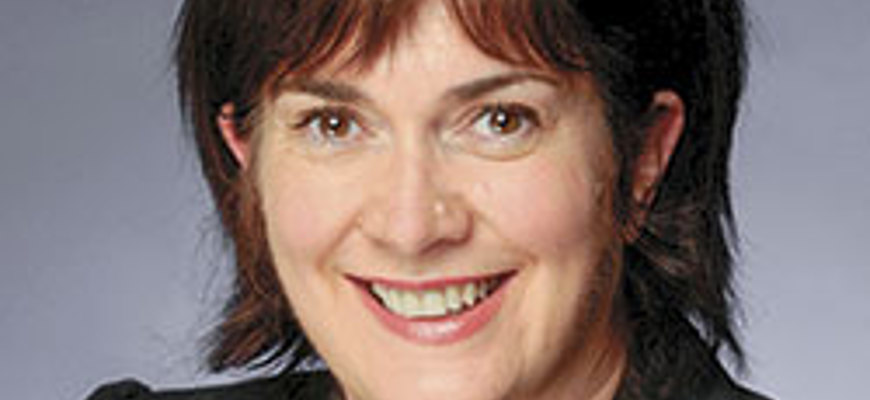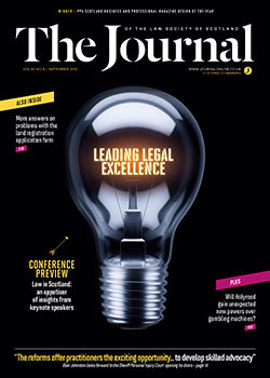Big budget brief

What was the career path to your current position?
I studied French and Italian at university and spent a year in France teaching English as a foreign language. During that year, which gave me time to really consider my future, I decided I would like to study law. I thought initially of combining languages and the law, though ultimately did not pursue this. When I came back from France, I completed my arts degree and began my law degree at Glasgow University. I did my traineeship with Glasgow District Council and stayed with the organisation through local government reorganisation to Glasgow City Council. I have had the opportunity to undertake a number of roles within the council, and been involved in exciting and innovative city projects.
How is your in-house legal team structured and how much input do you have on business strategy and governance?
In Glasgow, there are 600,000 residents and the council has a £2.5 billion gross revenue budget, so the work and challenges for the legal team are wide and varied and our teams have to be aligned to the business to meet those challenges. Along with the legal managers, I play an active role in ensuring that the legal team achieves this and that we have appropriate governance in place.
Our legal team is split into two – corporate and property, and litigation and licensing – each with an executive legal manager. In the litigation and licensing team, we have 22 full time employees.
Litigation deals with matters such as claims, commercial issues, procurement, social work, homelessness, employment, equal pay issues and fatal accident inquiries. Within litigation, we have an Edinburgh court service dealing with our Court of Session work. Licensing supports the statutory licensing function, and played a key role in supporting delivery of the Commonwealth Games.
In our corporate and property team, we have 35 employees and the work includes complex property and contract work, such as leases, development agreements and the TIF (Buchanan Street tax incremental finance scheme), as well as dealing with matters such as freedom of information and data protection, procurement and state aid, intellectual property, and so on. We manage a number of projects, and are also part of a wider project team such as Commonwealth Games, where the legal team played a huge role in terms of operations, infrastructure, venue use agreements and cultural activities in the city. The legal team also supported the Future Cities Project, established after the city won £24 million funding from Innovate UK by demonstrating how to make life in the city smarter, safer and more sustainable and looking at the potential of open data.
What is a normal day?
I may have a management meeting, either with senior council managers or one of my team members about particular projects or pieces of work, or general management and HR issues. I manage five teams in my current role as Head of Legal and Administration: the two legal teams plus the corporate procurement team, the registrar’s team, and the democratic services team. I am also likely to have meetings related to projects I am working on, such as the Council Family Review, which is looking at our structures and governance; the City Deal, where I was responsible for establishing the legal governance and designed the assurance framework; and Future Cities. Issues also arise in a typical day relating to, for example, audits, general legal queries etc. In addition, I attend and provide support at various boards, committees and council meetings.
What motivates you on a Monday morning?
I am a Glaswegian through and through. I love Glasgow. It is a great privilege to work for the city and I like to feel that in some small way I am supporting its work, while at the same time being able to undertake really interesting and challenging work. A good example of this return was the development of the Athletes’ Village, a 35-hectare regeneration site in the East End that housed more than 7,000 athletes during the Games and has left a legacy of private and social housing, and a care home for the elderly.
What do you really enjoy about working in-house?
I enjoy having the opportunity to become involved in, and influence, a variety of different and exciting city projects and being part of the delivery team. I am constantly challenged and this keeps me on my toes! I work in an environment where we have fantastic teams, and extremely talented, professional and committed staff and managers with a strong public sector ethos.
Has your organisation experienced any major change recently?
Local authorities are facing severe cuts in funding, so the council is undergoing a major transformation agenda to manage the challenges ahead and assess the opportunities that any major change can bring. Another major change relates to the signing of the City Deal by the Glasgow and Clyde Valley local authorities. It is the first of its kind in Scotland and the biggest in the UK, with £1.13 billion of funding from the Scottish and UK Governments. It is anticipated that this will permanently increase the GVA (the gross value added economic measure) of the region by 4.4%.
What makes a good in-house lawyer? What’s your career advice for young lawyers who want to start an in-house career?
Key things are to be a team player, be approachable, adaptable and flexible, have a “can do” attitude, and be solution driven. Avoid legalese where possible and be clear and concise in the advice you give. It is important to understand the business, the structures, culture and political drivers so that the advice given is fully rounded and not given in a vacuum. It is important to share the values of the organisation you work for and fully support its objectives. It is also important to recognise the skills you develop as an in-house lawyer, many of which are transferable and can give lawyers the opportunity to develop into other roles. For example, both our chief executive and acting executive director of corporate services are lawyers and fantastic role models for moving into other areas of the business.
What do you look for when you seek external legal advice from solicitors or counsel?
We instruct counsel for court matters and for opinions on complex or high-profile issues, and we instruct external solicitors for specialist areas, or if resource is required for a large project. It is important that there is good teamworking and mutual respect for each other’s skills – an ethos that will develop positive working relationships and good teamwork.
What are the current hot legal topics in your sector, and how does the future look for in-house lawyers?
There are a number of hot topics, from the implications of the Community Empowerment Act to the Smart Cities agenda and use of data and technology to deliver more intelligent and joined-up services, the new procurement legislation, sustainability, community benefits, and a number of other matters. We are kept very busy, so the future looks very good for in-house lawyers.
Does Scottish legal education and training provide the necessary skills for working in-house in your organisation?
It is a great foundation and the quality of the qualified solicitors and trainees who come to the council is of the highest standard. In saying that, new employees must appreciate that it does take time to learn about and understand the business, and recognise that this is a lifelong learning curve.
How do you think in-house lawyers today are perceived within the legal profession?
I think in years gone by, we were probably seen as the poor relation, but that has certainly changed. There is such a wide variety of in-house work, and it is probably not well enough understood, which can then lead to it not being as highly valued. However, where we work closely with legal firms and counsel, there is clear understanding and respect for each other’s knowledge and skillsets.
How do you see the current remit of the ILG committee developing?
It is very important for the ILG to continue to raise the profile of in-house lawyers. I was very interested in the recent article on Janette Wilson (Solicitor to the Church of Scotland: Journal, July 2015, 36). There is now a much greater interest in working in the public sector because of the variety and quality of work, and the working conditions. I now receive approaches from people wishing to work for the council because they have heard very positive things about the type and variety of work we do.
What is the most unusual work request you have had?
Someone very kindly left a bequest to the council on the condition that a trust was established “for the research and development into the origin of the begonia”. Our Parks Team was delighted and I learned some new things about begonias that I had never known before!
What keeps you busy outside the office?
My family. Everything revolves around them and we enjoy outdoor activities, eating out, going on walks and gardening. I have two young daughters, and during the week it is like a military operation picking up and dropping off, between school and out-of-school activities. However, we have a strong support network of family and local parents… and the kids love it!
What would you take with you to a desert island, and what would you put in Room 101?
I would take the chef of the Crabshakk restaurant, Glasgow, with me to the desert island. Anybody who has visited the restaurant will understand why I am suggesting that! I debated whether to take the Inspector Montalbano books, which I love because they transport me to Italy with their love of food, sense of humour and landscape, but the chef won out. I would put cold calls in room 101 without a doubt. I am regularly offered loft insulation – and I live in a ground floor flat!
In this issue
- Good health – fair question?
- Time to raise the age of criminal responsibility
- Adoption of foreign children – a clash of cultures?
- Presumed liability: the case for action
- Le Bief Bovet: 700 years of litigation
- Reading for pleasure
- Opinion: James O'Reilly (fuller version)
- Opinion: James O'Reilly
- Book reviews
- Profile
- President's column
- Land Register completion update
- People on the move
- Conference calls
- A new court rises
- Questions of form
- Charities - why reserves matter
- Place your bets
- Pensions: a formula unravelled
- Whereabouts unknown?
- Lego Man keeps his mark
- The company one keeps
- Scottish Solicitors Discipline Tribunal
- Land, leases and LBTT
- Big budget brief
- Support sought as Napier joins the law clinics
- Public Guardian's fees to increase
- Law reform roundup
- TCPD: the Update way
- How are we doing?
- Thanks, but no thanks
- Ask Ash






